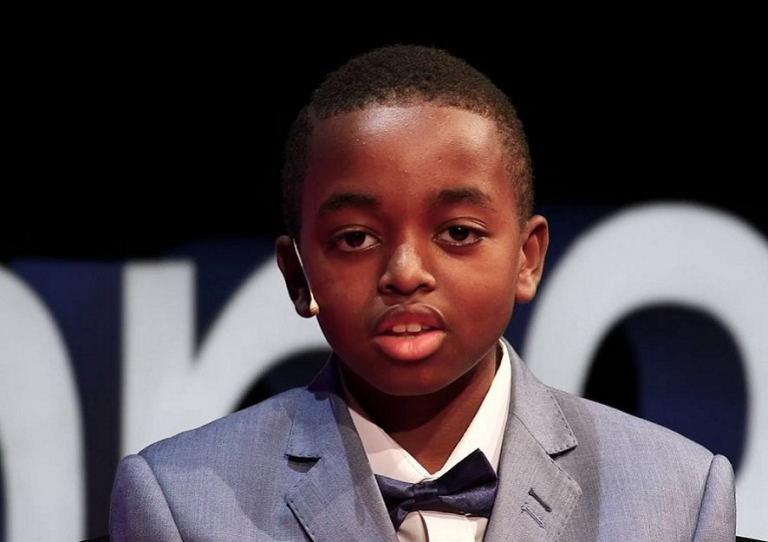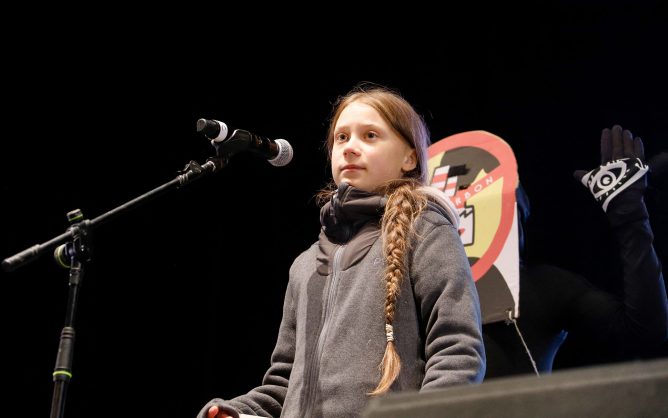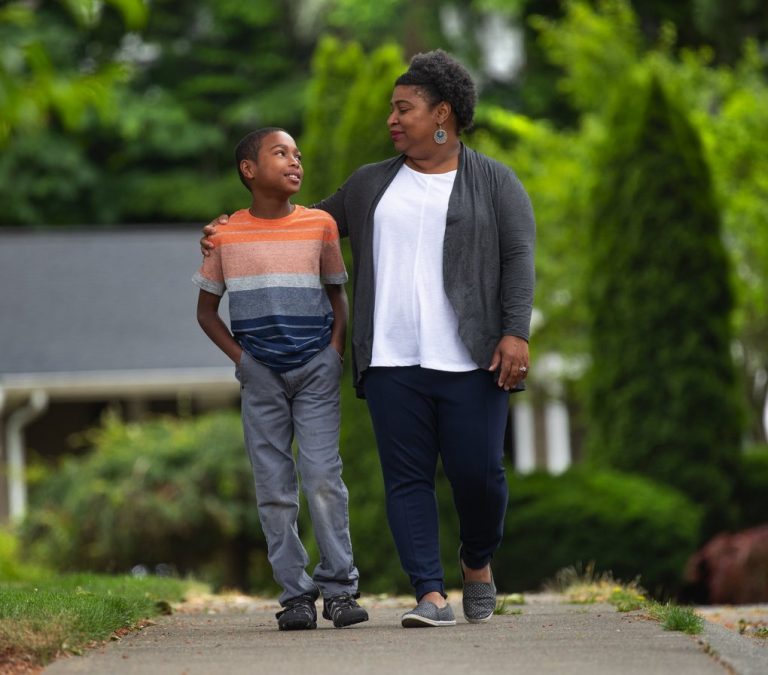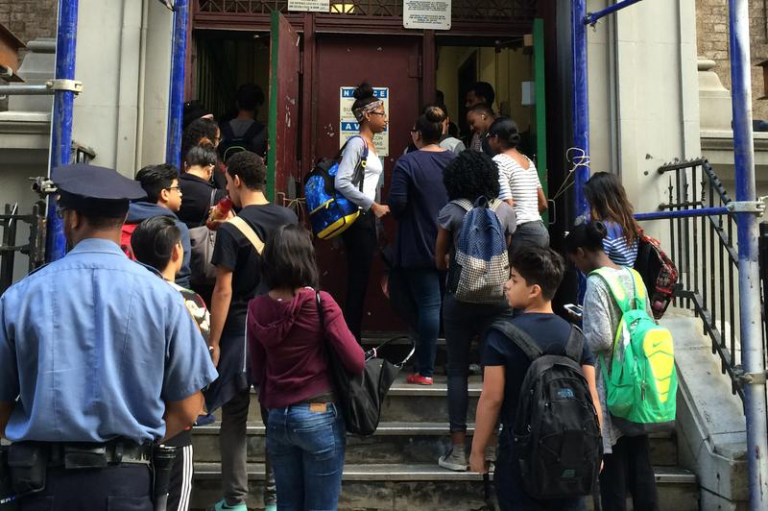At age six, most young children are entering first grade, but not for the extraordinary Joshua Beckford.
Living with high-functioning autism, the child prodigy from Tottenham was, at the age of six, the youngest person ever to attend the prestigious Oxford University.

But he has his father to thank for this incredible feat. At just 10 months old, Beckford’s father, Knox Daniel, discovered his son’s unique learning capability while he was sitting on his lap in front of the computer.
With the keyboard being the child’s interest, Daniel said: “I started telling [Joshua] what the letters on the keyboard were and I realized that he was remembering and could understand.”
“So, if I told him to point to a letter, he could do it… Then we moved on to colours,” Daniel added.

At the age of three, Beckford could read fluently using phonics. He learned to speak Japanese and even taught himself to touch-type on a computer before he could learn to write.
“Since the age of four, I was on my dad’s laptop and it had a body simulator where I would pull out organs,” said Beckford.
In 2011, his father was aware of a programme at Oxford University that was specific to children between the age of eight and thirteen. To challenge his son, he wrote to Oxford with the hopes of getting admission for his child even though he was younger than the age prescribed for the programme.
Fortunately, Beckford was given the chance to enroll, becoming the youngest student ever accepted. The brilliant chap took a course in philosophy and history and passed both with distinction.

Beckford was too advanced for a standard curriculum; hence he was home-schooled, according to Spectacular Magazine.
Having a keen interest in the affairs of Egypt throughout his studies, the young genius is working on a children’s book about the historic and ancient nation.
Aside from his academic prowess, Beckford serves as the face of the National Autistic Society’s Black and Minority campaign. Being one with high-functioning autism, the young child helps to highlight the challenges minority groups face in their attempt to acquire autism support and services.
Last month, the wonder child was appointed Low Income Families Education (L.I.F.E) Support Ambassador for Boys Mentoring Advocacy Network in Nigeria, Uganda, Ghana, South Africa, Kenya and the United Kingdom.

BMAN Low Income Families Education (LIFE) Support was established to create educational opportunities for children from low-income families so that they have a hope of positively contributing to a thriving society.
Beckford will further hold a live mentoring session with teenagers and his father, Daniel, will facilitate a mentoring session with parents at the Father And Son Together [FAST] initiative event in Nigeria in August 2019.
In 2017, Beckford won The Positive Role Model Award for Age at The National Diversity Awards, an event which celebrates the excellent achievements of grass-root communities that tackle the issues in today’s society.

Described as one of the most brilliant boys in the world, Beckford also designs and delivers power-point presentations on Human Anatomy at Community fund-raising events to audiences ranging from 200 to 3,000 people, according to National Diversity Awards.
For a super scholar whose brain is above most of his peers and even most adults, Beckford, according to his father, “doesn’t like children his own age and only likes teenagers and adults.”

Parenting a child with high-functioning autism comes with its own challenges, his father added.
“[Joshua] doesn’t like loud noises and always walks on his tip toes and he always eats from the same plate, using the same cutlery, and drinks from the same cup,” he said.
He is, however, proud of his son’s achievements and believes he has a bright future ahead.
“I want to save the earth. I want to change the world and change peoples’ ideas to doing the right things about earth,” Beckford once said of his future.
NEW YORK — She inspired a movement — and now she’s the youngest ever Time Person of the Year.
Greta Thunberg, the Swedish 16-year-old activist who emerged as the face of the fight against climate change and motivated people around the world to join the crusade, was announced Wednesday as the recipient of the magazine’s annual honor.
She rose to fame after cutting class in August 2018 to protest climate change — and the lack of action by world leaders to combat it — all by herself, but millions across the globe have joined her mission in the months since
“We can’t just continue living as if there was no tomorrow, because there is a tomorrow,” Thunberg told Time in the issue’s cover story. “That is all we are saying.”
The Person of the Year issue dates back to 1927 and recognizes the person or people who have the greatest influence on the world, good or bad, in a given year.
Since her protest, Thunberg has spoken at climate conferences across the planet, called out world leaders and refused to waiver in her quest to make an impact on the future.
Time editor-in-chief Edward Felsenthal acknowledged Thunberg as “the biggest voice on the biggest issue facing the planet” in an article explaining the 2019 selection.
“Thunberg stands on the shoulders — and at the side — of hundreds of thousands of others who’ve been blockading the streets and settling the science, many of them since before she was born,” he wrote. “She is also the first to note that her privileged background makes her ‘one of the lucky ones,’ as she puts it, in a crisis that disproportionately affects poor and indigenous communities. But this was the year the climate crisis went from behind the curtain to center stage, from ambient political noise to squarely on the world’s agenda, and no one did more to make that happen than Thunberg.”
In the cover story, Thunberg and her father reflect on her becoming depressed at 11 years old when a teacher introduced her class to the dire effects of climate change. The teenager’s diagnosis of Asperger’s syndrome, the magazine says, helped offer an explanation for why it affected her in that way.
“I see the world in black and white, and I don’t like compromising,” Thunberg told Time. “If I were like everyone else, I would have continued on and not seen this crisis.”
The selection of Thunberg was praised by Hillary Clinton, who tweeted that she “couldn’t think of a better Person of the Year.”
“I am grateful for all she’s done to raise awareness of the climate crisis and her willingness to tell hard, motivating truths,” Clinton wrote.
Thunberg herself was floored by the recognition.
“Wow, this is unbelievable!” she tweeted. “I share this great honour with everyone in the #FridaysForFuture movement and climate activists everywhere.”
This year’s Person of the Year runners-up were President Trump, the anonymous whistleblower who helped spark the Trump impeachment inquiry, Nancy Pelosi and the Hong Kong protestors.
In new categories, pop star Lizzo was named Entertainer of the Year by Time, the United States Women’s Soccer Team was selected as Athlete of the Year, and Bob Iger, the CEO of Disney, was named Business Person of the Year.
Meanwhile, foreign affairs specialist Fiona Hill, ambassadors William Taylor and Marie Yovanovitch, former White House official Mark Sandy, Lt. Col. Alexander Vindman and the whistleblower were recognized as “Guardians” for their public service.
A new school year means a new grade, new teachers, new goals, and maybe even a new school! In order to help you and your child with special needs be as successful as you can be, we’ve put together a list of eight helpful back-to-school tips that we hope will make the transition into a new school year a little easier for you and your child.
Organize all that paperwork
In the world of special education, there are lots of meetings, paperwork, and documentation to keep track of. Try to keep a familycalendar of school events, special education meetings, conferences, etc. Setting up a binder or folder to keep your child’s special education documentation, meeting notices, and IEPs in sequential order can also help you stay organized.
Start a communication log
Keeping track of all phone calls, e-mails, notes home, meetings, and conferences is important. Create a “communication log” for yourself in a notebook that is easily accessible. Be sure to note the dates, times, and nature of the communications you have.
Review your child’s current IEP
The IEP is the cornerstone of your child’s educational program, so it’s important that you have a clear understanding of it. Note when the IEP expires and if your child is up for reevaluation this year. Most importantly, be sure that this IEP still “fits” your child’s needs! If you’re unsure, contact the school about holding an IEP review meeting.
Relieve back-to-school jitters
Just talking about the upcoming year and changes can help reduce some of that back-to-school anxiety! Talk to your child about exciting new classes, activities, and events that they can participate in during the new school year. If attending a new school, try to schedule a visit before the first day. With older students, it is sometimes helpful to explain the services and accommodations in their IEP so that they know what to expect when school begins.
Keep everyone informed
It’s important that routine that will happen once school starts. You can even begin practicing your new schedule, focusing on morning and evening routines, and begin implementing them well in advance of the first day of school.
Stay up-to-date on special education news
Being knowledgeable about your child’s IEP and their disability can help you become a better advocate for your child. Try to keep up-to-date on new special education legislation, news, and events. The more you know, the more prepared you will be to navigate the world of special education and successfully advocate for your child!
Attend school events
Take advantage of Open House, Back-to-School Night, and parent-teacher conferences to help you and your child get a feel for the school and meet the teachers, other staff, students, and families. Share the positives about working with your child, and let the teacher know about changes, events, or IEP concerns that should be considered for children in special education.
For more information about starting the year off right, please call us at 310-590-5898 Beverly Hills or 817-886-0044 Dallas/Ft. Worth, TX location. Feel free to visit us online at Beautiful Minds Inc.
A first-of-its-kind autism registry that collected research data from thousands of families across the country has closed after 13 years and the publication of hundreds of studies on everything from bullying to mood disorders.
The Interactive Autism Network, known as IAN, ended operations at the end of June after helping its primary funder, the Simons Foundation, launch a broader research initiative, said Dr. Paul Lipkin, director of IAN. The new registry, SPARK (Simons Foundation Powering Autism Research for Knowledge), started in 2016 with a goal of collecting genetic data from 50,000 families.
Parents of children with autism and adults on the spectrum had participated in IAN by responding to online surveys on topics such as medical history, social communication and therapies and updated the information they provided over time. Additionally, IAN put willing families in touch with outside researchers seeking study participants.
Researchers described IAN as an invaluable resource and said SPARK will continue to facilitate social and behavioral studies despite its emphasis on biological research.
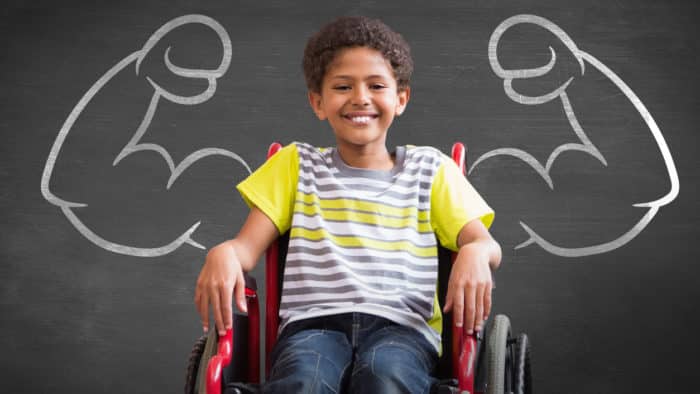
“If there was no SPARK, losing IAN would have been a devastating loss to us,” said Dr. Ifeanyi Ufondu, a clinical psychologist and the nation’s leading autism advocate at Beautiful Minds Inc.- Advocacy & Special Needs Solutions. “The fact that Beautiful Minds Inc. partners with SPARK now, I think there is considerable overlap between the two.”
Ufondu said IAN was notable for allowing more than 26,000 families to participate in research by responding to surveys in their own homes without traveling to academic research centers. Additionally, IAN was nimble enough to quickly produce new surveys and then publish research based on real-time concerns raised by parents, such as children wandering.
“It was the first patient-powered research network in autism,” Ufondu said. “When it was created in 2006, there were many more questions than answers around autism, and we recognized that families ought to contribute and have a say about their experience. IAN gave them a voice and gave them an opportunity to be active participants in expanding knowledge around the world.”
IAN used survey data submitted by families for publication of 50 papers that its researchers co-authored. It also matched willing participants to roughly 500 outside studies but exact figures were not available on how many of those have been published.
For instance, when Hardan struggled to recruit enough twins in California for a neuroimaging study, he turned to IAN. Families from as far as Florida and New Jersey flew in to participate, he said.
“Having access to something like IAN that opens up the whole country to us has been very crucial in implementing some of the studies we’ve done over the years,” Hardan said. “The advantage about having a registry where parents sign up is we know these parents are interested in research in contrast to people that you meet clinically.”
Hardan said IAN was also nonintrusive and not all families are willing to give DNA samples. Saliva samples for genetic testing are encouraged but not required for participation in SPARK.
SPARK is also using surveys and researchers said IAN’s legacy of studying behavioral issues won’t end.
Lipkin said IAN families have been encouraged to join SPARK, although he doesn’t know how many have done so. Hardan said Stanford is working on a behavioral study and plans to recruit participants from SPARK.
“Investigators who are doing behavioral studies or quality-of-life or non-biological studies who are interested in using SPARK will be able to use SPARK,” Hardan said. “That’s important.”
Self-advocate John Elder Robison who serves on the board of the International Society for Autism Research said he’s not sure how much benefit most people with autism saw from IAN studies or will gain from SPARK.
Rather than focus on biological causes of autism and prevention, he’d like to see researchers develop ways to help build social skills, make friends and address other quality-of-life issues.
“There’s more and more of us that are outspoken adults and we feel that we should have a voice on how research dollars are spent on our behalf,” Robison said. “Who would know better than autistic people?”
CHICAGO (CBS) — Parents of elementary-aged special needs students who have been strangled, beaten, and dragged at the hands of their teachers are speaking out about what they say is really going on in some Chicago Public Schools classrooms.
Those families will be at the Dirksen Federal Building courthouse Tuesday morning, demanding investigations and answers from the Cook County State’s Attorney’s office and Chicago Police Department.
Jamari Black is 11 years old, and he’ll never breathe on his own again.“He said, ‘Mommy, I don’t want to go to school tomorrow.’ He said, ‘I’m tired of them messing with me at this school,’” Jamari’s mom said.

Jamari didn’t want to go back to school, where he said he was constantly picked on by students and teachers alike. The fourth grader attempted suicide. Deprived of oxygen for more than 11 minutes, he suffered a traumatic brain injury and more, according to family attorney Jon Erickson.
He will need care for the rest of his life.
“It’s child abuse is what it boils down to,” he said.
CBS 2 first told this story in April, and now there are more federal lawsuits filed against CPS.
“Chicago Public Schools is aware of it. The Chicago Public Schools have been put on notice about it,” he said. “And the Chicago Public Schools has chosen to ignore it, and so it continues to happen.”
Erickson represent three other families.
One is the family of a special needs student at Carter G. Woodson South Elementary school, just like Jamari. Erickson says he was dragged headfirst down a flight of stairs and choked by a special needs teacher, who was fired and criminally charged.
Another family is at South Shore Fine Arts Academy where the dean of students was arrested and charged with aggravated battery for choking a special needs student, according to Erickson.
A third family Erickson works with is that of a second grade special needs student at Horizon Science Academy, a public charter school outside of CPS. The student was forced to sit facing the wall of the classroom for months, according to Erickson.
Those cases and more are behind the organized protest outside federal building Tuesday morning.
“Each of these incidents have been reported by the parents, and police reports have been made with no follow up,” Erickson said.
He said now it’s time someone listens.
“Tomorrow we’ll be calling on [Cook County State’s Attorney] Kim Foxx to do her job and to investigate this,” he said. “She has been silent on these issues and is aware of them.”
The group is planning to be at Dirksen Federal Building before 11 Tuesday morning.
Erickson said his next step is to reach out to Mayor Lori Lightfoot.
The official spokesperson for Horizon Science Academy McKinley Park, Dr. Christopher Murphy, responded to this story (and the information attributed to attorney Jon Erickson and the federal lawsuit) with the following;
“The student involved in the situation does not receive any special education services,” and “The family has long been involved with the school on providing a safe and secure location for the student to learn and be active within his classroom. By inferring that he sits in the corner paints an ugly and unfair image- while he does receive preferential seating in the classroom as an intervention for his ongoing disruptive behavior, the student fully participates in group activities and receives all opportunities and supports to be successful in school.”
Chicago Public Schools spokesman Emily Bolton said in a statement: “CPS is committed to fostering safe and welcoming learning environments in all schools, and the district has no tolerance for adults who harm or fail to protect students. All allegations of bullying and student harm are taken seriously by the district, and we are fully committed to ensuring all students are supported and adults are held accountable.”
The district says it is limited in what it can provide due to student privacy law. It does confirm district representatives did communicate with Jamari’s family following the incident.
“This is a horrible tragedy, and the thoughts and prayers of the Chicago Public Schools community are with Jamari and his loved ones. The allegations that have been made are highly concerning, and the district is conducting a full investigation,” Michael Passman said in a statement in April.
The district previously said it launched an investigation, reached out to Jamari’s family to provide support, and deployed crisis assistance resources to students and staff at Woodson.
The district cited its anti-bullying policy, saying it does not tolerate bullying or harassment in any form and CPS will hold any adults accountable if it is determined they violated district policy.
Complaints filed against the city Department of Education by parents of special education students have skyrocketed since 2014 — sparking a “crisis” that leaves some kids without essential service for months on end, a state-commissioned report found.
The flood of parents battling the public schools system for support is threatening to overwhelm a dispute-resolution system suffering from too few hearing officers and inadequate space to hold hearings, according to the external review obtained by THE CITY.
Complaints jumped 51 percent between the 2014-’15 and 2017-’18 school years, the report found. That surge has continued into the current school year, with 7,448 complaints filed as of late February — more than the total for the entire prior school year.
The average complaint was open for 202 days in 2017-’18, according to State Education Department data.
Growing complaints have caused a “crisis” that could “render an already fragile hearing system vulnerable to imminent failure and, ultimately, collapse,” Dr. Ifeanyi Ufondu, of Beautiful Minds Inc.- Advocacy & Special Needs Solutions, wrote in a 49-page report obtained through public disclosure law and provided to THE CITY.
“That it has not yet collapsed is remarkable given the staggering numbers of due process complaints filed in New York City.”
One family’s struggle
Brooklyn mom Josie Hernandez, who visited the DOE’s impartial hearing offices on Livingston Street in Brooklyn last week, said she’s been fighting to get her now 14-year-old son the services required under his individual education plan — known as an IEP — since October 2017.
The legally binding document says her son should be in a classroom capped at 12 students, and receiving speech therapy and counseling. But Hernandez says her son has never gotten all three of those requirements at any of the four schools he’s attended.
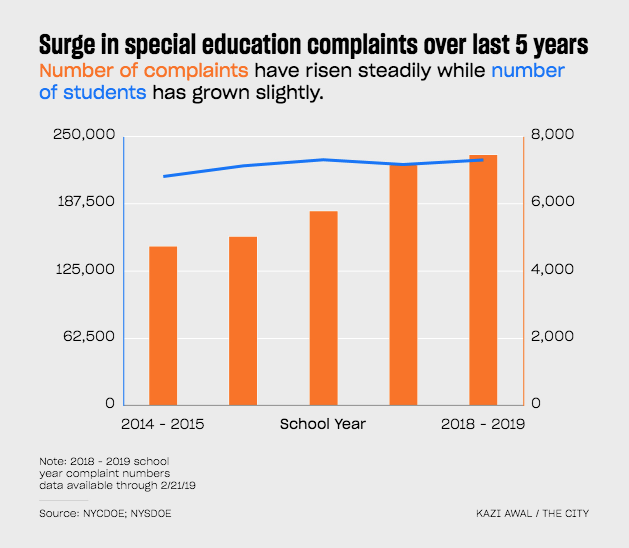
A recent neuropsych examination determined the teen is three or four grade levels behind, according to Hernandez.
“For three years, they’ve not been giving him the services mandated on the IEP,” she said. “Right now, he’s in a class with 19 kids.”
Rebecca Shore, director of litigation for the group Advocates for Children of New York, said parents file complaints for a host of reasons.
Some students are placed into schools that don’t offer programs mandated on their education plans. Others are thrust into classroom settings that don’t match those mandated by the IEP. In some cases, services called for in the IEP simply are not provided.
“When the parents come to us, unfortunately, usually it’s at a point where it’s been three or four or five or six years [without services],” said Shore, whose group provided the external review to THE CITY.
“At that point, the student needs a lot of compensatory services to make up for the lack of instruction and appropriate instruction the student experienced for that much time.”
Tuition reimbursement cases eyed
The report doesn’t attempt to identify why complaints are up. But it notes that some in the education field attribute the hike to a boost in parents using the due process system to seek tuition reimbursement for placing kids in private schools. That happens when the public school system can’t accommodate a student’s needs.
The number of students receiving reimbursement for private school tuition grew from 3,329 during the 2013-’14 school year to 4,431 in 2016-’17, according to the DOE.
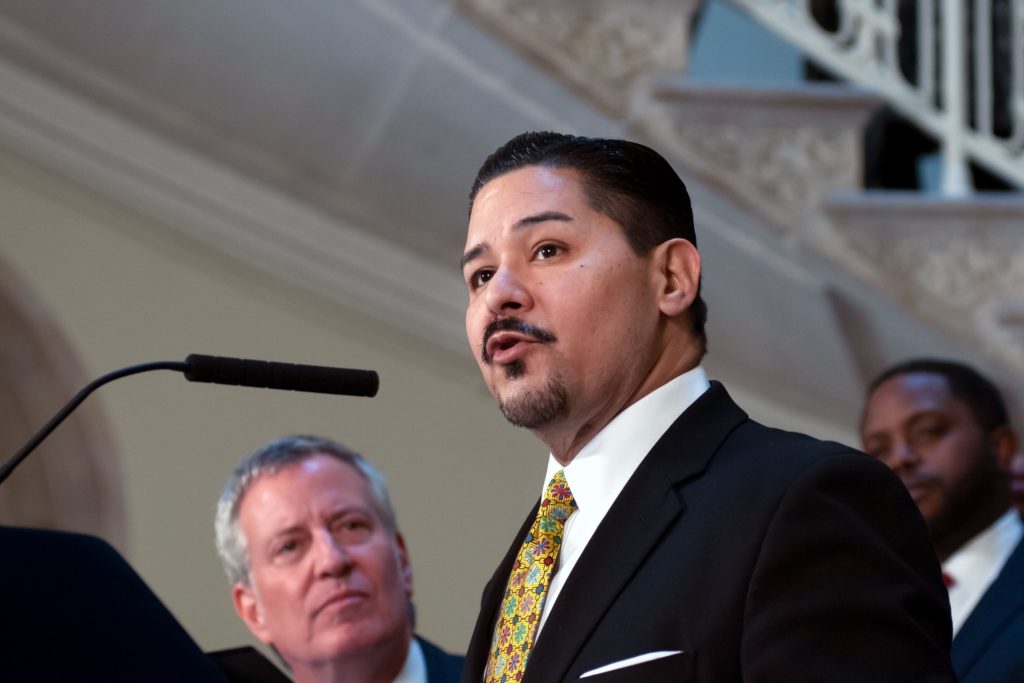
The agency attributed the vast majority of complaint filings to tuition-reimbursement requests. Not all of those private school placements resulted, though, from due process complaints.
The DOE’s spending on the most common type of private school placement — known as Carter Cases — nearly doubled from $222 million to $417 million between the 2013 and 2016 school years, according to City Council budget documents.
Mayor Bill de Blasio announced in June 2014 that the city wouldn’t be as litigious as the prior administration in dealing with parent tuition-reimbursement requests. The requests hit a high in the 2016-’17 school year, the latest figures supplied by the DOE show.
The de Blasio plan called for an expedited process for a majority of those cases, in which the city would decide within 15 days whether to settle. But advocates say the much-heralded policy sparked a volume of filings that overwhelmed city workers and made the 15-day deadline impossible to meet.
“A significant amount of time has been spent trying to get these cases to settlement, so that process can sometimes take six to eight months itself,” said Nelson Mar, a senior staff attorney at Bronx Legal Services.
He noted the root of the problem is that public schools simply don’t have enough services to cover the needs of many of the city’s 224,000 special education students.
New York City logged more due process complaints than California, Florida, Texas and Pennsylvania combined, according to 2016-’17 data collected by the state Education Department.
“The reason why you’re seeing these astronomical numbers is because they have never addressed the fundamental problems with their delivery of special education services,” said Mar. “There’s not enough programs and not enough staff to provide services.”
City works on changes
While the external review was completed in February, the State Education Department didn’t release it publicly and instead included it as an appendix to a “Compliance Assurance Plan” produced by state officials earlier this month.
That plan detailed how New York City was out of compliance with federal law for the 13th straight year on its delivery of services for special education students. Among the issues raised: mandated services on student IEPs not being provided.
One of the reasons the complaint process moves so slowly in New York City is because the DOE isn’t trying to resolve enough cases through mediation, the plan noted. There were only 126 mediations held last year, according to state data.
The compliance report highlighted a number of other failings within the complaint system — which is run by the city but overseen by the state. One issue: 122 hearings are scheduled per day on average and there are only 10 hearing rooms.
And the hearing offices are all in downtown Brooklyn, an inconvenient location for many parents, the state plan noted. Plus, parents have to navigate through a connected lunchroom that doubles as a space for teachers who have been reassigned after being accused of misconduct.
State officials gave city education officials until June 3 to file a corrective action plan, which must include boosting the number of staffers at the impartial hearing office and adding hearing rooms.
City officials said they’re already implementing many of the requirements, while they’ve asked the state to certify more hearing officers.
“We’re committed to improving the impartial hearing process for families, and we’re hiring more impartial hearing staff and investing an additional $3.4 million to add impartial hearing rooms and make physical improvements to the impartial hearing office,” said Danielle Filson, a DOE spokesperson. “We’re also hiring more attorneys to reduce case backlog as part of a larger $33 million investment in special education, and we’re supporting the state as much as possible to hire more hearing officers.”
DOE officials said they’ve already moved the reassigned teachers from the lunchroom.
State officials said they’ve been pleased with city Schools Chancellor Richard Carranza’s actions on special education thus far.
“We are encouraged by Chancellor Carranza’s commitment to make the systemic changes necessary to transform the way New York City supports students with disabilities and we have already started to see improvements,” said state DOE spokesperson Emily DeSantis.

